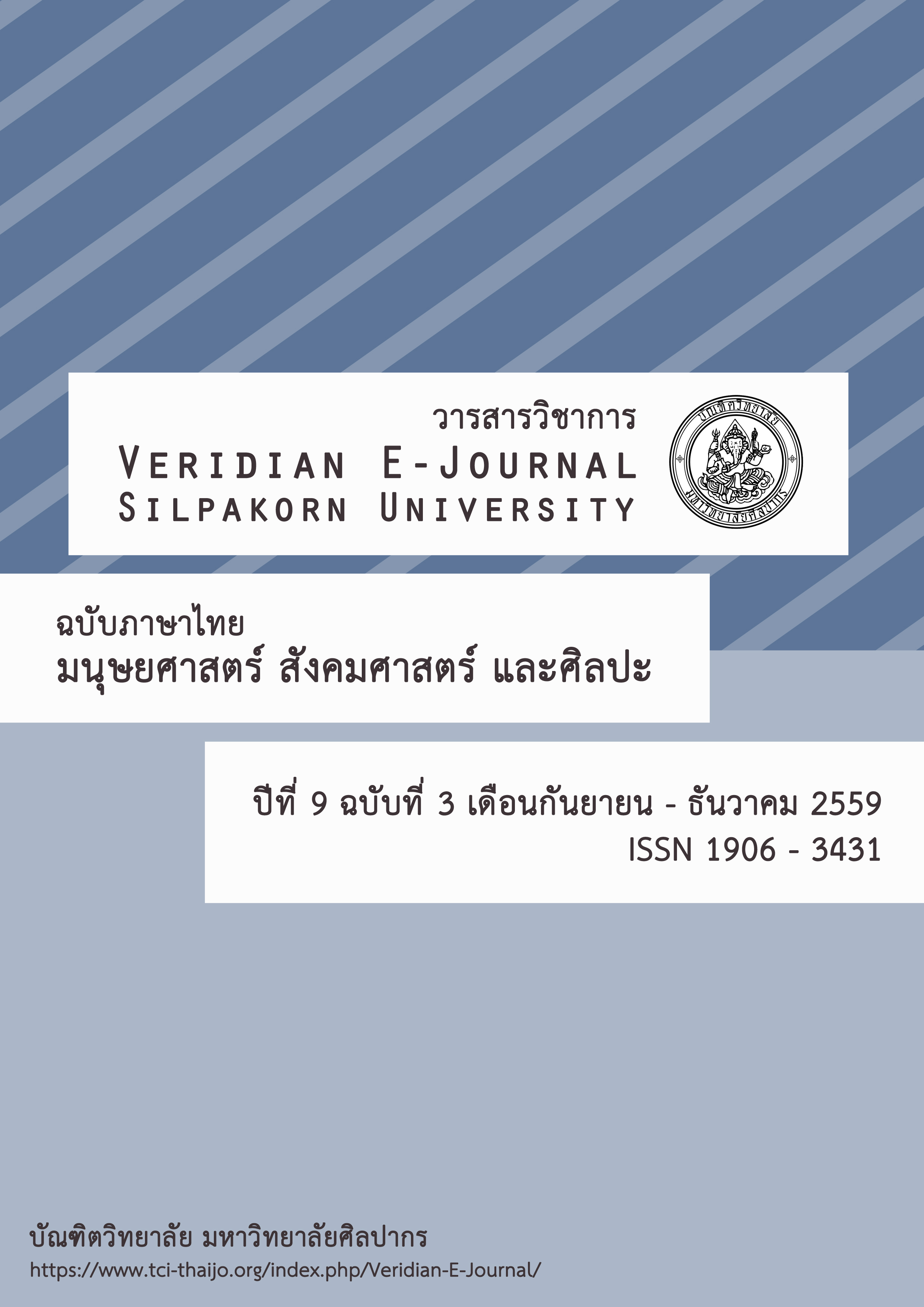ความยุติธรรมในมิติด้านวัฒนธรรม จริยธรรมทางศาสนา และธรรมาภิบาล
Main Article Content
บทคัดย่อ
การวิจัยครั้งนี้มีวัตถุประสงค์เพื่อศึกษาการรับรู้ความยุติธรรมจากปัจจัยทางวัฒนธรรม จริยธรรมทางศาสนา หลักธรรมาภิบาลและความยุติธรรมในองค์การ และเพื่อศึกษาความสัมพันธ์เชิงสาเหตุระหว่างปัจจัยทางวัฒนธรรม จริยธรรมทางศาสนา หลักธรรมาภิบาล และความยุติธรรมในองค์การ การวิจัยนี้เป็นงานวิจัยเชิงปริมาณ (Quantitative Research) ผู้วิจัยใช้แบบสอบถาม (Questionnaire) เป็นเครื่องมือในการเก็บรวบรวมข้อมูลเชิงปริมาณ ประชากรและกลุ่มตัวอย่างที่ใช้ในการศึกษาได้แก่บุคลากรในองค์การภาครัฐและเอกชนใน 4 ภาค ของประเทศไทยจำนวน 400 คน สถิติที่ใช้ในการวิเคราะห์ข้อมูล ได้แก่ ค่าร้อยละ (Percentage) ค่าเฉลี่ย (Mean) ค่าเบี่ยงเบนมาตรฐาน (Standard Deviation) การวิเคราะห์สัมประสิทธิ์สหสัมพันธ์ (Pearson Correlation) การวิเคราะห์การถดถอยพหุคูณ (Multiple Regression Analysis: MRA) การวิเคราะห์สมการโครงสร้างเชิงเส้น (Structural Equation Modeling: SEM) ผลการวิจัยพบว่า
การรับรู้ความยุติธรรมจากปัจจัยทางวัฒนธรรมโดยรวมอยู่ในระดับมาก เมื่อพิจารณารายด้าน พบว่า วัฒนธรรมครอบครัวมีค่าเฉลี่ยสูงสุด รองลงมาได้แก่ วัฒนธรรมองค์การ และวัฒนธรรมสังคม ตามลำดับ การรับรู้ความยุติธรรมจากจริยธรรมทางศาสนา โดยรวมอยู่ในระดับมาก เมื่อพิจารณารายด้าน พบว่า ความเชื่อในความยุติธรรมตามกฎแห่งกรรมมีค่าเฉลี่ยสูงสุด รองลงมาได้แก่ พรหมวิหาร 4 และการเว้นจากอคติ 4 ตามลำดับ การรับรู้ความยุติธรรมจากหลักธรรมาภิบาลโดยรวมอยู่ในระดับมาก เมื่อพิจารณารายด้าน พบว่า หลักความรับผิดชอบมีค่าเฉลี่ยสูงสุด รองลงมาได้แก่ หลักความประหยัด หลักคุณธรรม หลักนิติธรรม หลักความโปร่งใส และหลักการมีส่วนร่วม ตามลำดับ การรับรู้ความยุติธรรมในองค์การ พบว่า การรับรู้ความยุติธรรมในองค์การโดยรวมอยู่ในระดับมาก เมื่อพิจารณารายด้าน พบว่า ปฏิสัมพันธ์ระหว่างบุคคลกับองค์การมีค่าเฉลี่ยสูงสุด รองลงมาได้แก่ การแบ่งปันผลตอบแทน และ กระบวนการขององค์การ ตามลำดับค่าสัมประสิทธิ์สหสัมพันธ์ระหว่างปัจจัยทางวัฒนธรรม จริยธรรมทางศาสนา และหลักธรรมาภิบาล กับความยุติธรรมในองค์การมีความสัมพันธ์กันอย่างมีนัยสำคัญทางสถิติที่ระดับ .01 ซึ่งคู่ที่มีค่าสัมประสิทธิ์สหสัมพันธ์สูงที่สุด คือ ความสัมพันธ์ระหว่างหลักธรรมาภิบาลกับความยุติธรรมในองค์การ ผลการวิเคราะห์การถดถอยแบบพหุคูณ พบว่า หลักธรรมาภิบาลส่งผลต่อความยุติธรรมในองค์การมากที่สุด รองลงมาได้แก่ปัจจัยทางวัฒนธรรม ส่วนจริยธรรมทางศาสนาไม่ส่งผลโดยตรงต่อความยุติธรรมในองค์การ ผลการวิเคราะห์ความสัมพันธ์เชิงสาเหตุระหว่างปัจจัยทางวัฒนธรรม จริยธรรมทางศาสนา และธรรมาภิบาล กับความยุติธรรมในองค์การ พบว่า หลักธรรมาภิบาลมีอิทธิพลโดยตรงต่อความยุติธรรมในองค์การมากที่สุด รองลงมาได้แก่ปัจจัยทางวัฒนธรรม นอกจากนี้ ปัจจัยทางวัฒนธรรมยังมีอิทธิพลทางอ้อมต่อความยุติธรรมในองค์การโดยผ่านหลักธรรมาภิบาล ในขณะที่จริยธรรมทางศาสนาไม่มีอิทธิพลโดยตรงต่อความยุติธรรมในองค์การ แต่มีอิทธิพลทางอ้อมต่อความยุติธรรมในองค์การโดยผ่านปัจจัยทางวัฒนธรรม
The purposes of this research were to study the recognition of justice from cultural factors, religious ethics, and good governance, and to study a causal relationship between cultural factors, religious ethics, good governance and organizational justice. This is a quantitative research. The research questionnaire was used as a tool to collect quantitative data. Population and samples in this study were 400 personnel who work in public and private organizations in the four regions of Thailand. Statistics used in this study consisted of Percentage, Mean, Standard Deviation, Pearson Correlation, Multiple Regression Analysis (MRA), and Structural Equation Modeling (SEM). The research results were found that recognition of justice from cultural factors, in total, was at high level. In particular, recognition of justice from family culture had the highest mean value, followed by organizational culture, and social culture respectively. Recognition of justice from religious ethics, in total, was at high level. In particular, recognition of justice from the belief in the rule of karma (conduct) had the highest mean value, followed by four sublime states of mind, and avoidance of four prejudices respectively. Recognition of justice from good governance, in total, was at high level. In particular, recognition of justice in terms of responsibility had the highest mean value, followed by economy, merit, law, transparency, and participation respectively. Recognition of organizational justice, in total, was at high level. In particular, interactional justice had the highest mean value, followed by distributive justice, and procedural justice respectively. The correlation between cultural factors, religious ethics, good governance and organizational justice was statistically significant at 0.01, which the highest correlation was a relationship between good governance and organizational justice. The results of multiple regression analysis showed that good governance had the highest influence on organizational justice, followed by cultural factors, whereas religious ethics had no direct influence on organizational justice. The results of a causal relationship between cultural factors, religious ethics, good governance and organizational justice showed that good governance had the highest direct influence on organizational justice, followed by cultural factors. In addition, cultural factors also had indirect influence on organizational justice through good governance, whereas, religious ethics had no direct influence on organizational justice, but had indirect influence on organizational justice through cultural factors.

